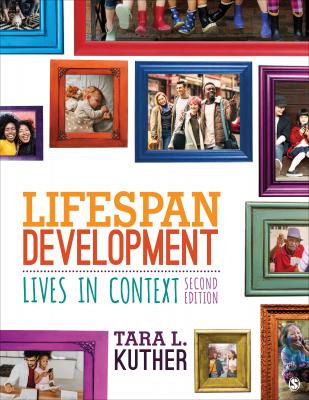Lifespan Development. Tara L. Kuther
Читать онлайн.| Название | Lifespan Development |
|---|---|
| Автор произведения | Tara L. Kuther |
| Жанр | Зарубежная психология |
| Серия | |
| Издательство | Зарубежная психология |
| Год выпуска | 0 |
| isbn | 9781544332253 |
Chapter 3
Updated coverage of Prenatal Development
New coverage of Contextual and Cultural Influences on Prenatal Care
New feature on Brain and Biological Influences on Development: Pregnancy and the Maternal Brain
Updated coverage and reorganized Principles of Teratology section to combine Developmental Delays and Sleeper Effects as Complicated Effects
Updated and reorganized Types of Teratogens
Updated and retitled Ethical and Policy Applications of Lifespan Development: Maternal Drug Use While Pregnant as Applying Developmental Science: Maternal Drug Use While Pregnant
Divided and expanded Childbirth and the Newborn into two sections
New Childbirth section includes new coverage of Medication During Delivery, Cesarean Delivery, Natural Childbirth, and Home Birth
Chapter 4
Updated coverage and streamlined presentation of Growth Norms, Breastfeeding, Solid Food, and Malnutrition
Updated coverage and retitled Ethical and Policy Applications of Life Span Development
Updated and streamlined coverage of Failure to Thrive
Updated coverage of Processes of Neural Development
New coverage of The Cerebral Cortex
Updated coverage of Experience and Brain Development
New coverage of Sleep and Brain Development
Updated coverage of Imitation to address recent criticism
Updated Lives in Context: Pain and Neonatal Circumcision
Updated coverage of Intermodal Perception and expanded to include discussion of affordances
Updated coverage and added new examples to Motor Development During Infancy and Toddlerhood
New feature on Brain and Biological Influences on Development: Hand Preference and Language Development in Infancy
Updated and expanded Motor Development as a Dynamic System
Chapter 5
Updated and expanded coverage of Deferred Imitation Tasks
Updated and expanded coverage of Core Knowledge Theory: An Alternative Perspective
Updated coverage of Organization of the Information Processing System, Attention, and Memory
Updated coverage of Categorization and retitled as Infants’ Thinking
New feature: Brain and Biological Influences on Development: Poverty and Development
Updated Information Processing Approach to Intelligence with new examples and retitled as Intelligence as Information Processing
Updated and expanded coverage of Prelinguistic Communication and First Words and Learning Words: Semantic Growth
Updated coverage of Learning Theory and Language Development and Nativist Theory and Language Development
Updated, reorganized, and expanded coverage of Interactionist Perspective on Language Development, including Biological Contributions to Language Development and Contextual Contributions to Language Development
New feature: Cultural Influences on Development: Culture and Language Development in Infancy
Chapter 6
Updated Cultural Influences on Development: Father–Infant Interactions, retitled from Lives in Context: Attachment to Fathers, and moved from later in the chapter
Reorganized Infants’ Emotional Experiences, creating sections with new coverage of Basic Emotions and Self-Conscious Emotions
Updated and rewrote Parental Interaction, integrating Interactive Play and Test of Wills
Updated and rewrote Social Referencing
Updated and revised Emotional Display Rules and Stranger Wariness
New Lives in Context feature on Maternal Depression and Emotional Depression, emphasizing the emotional effects of ongoing reciprocal interactions over infancy
Updated Styles of Temperament and expanded to include Mary Rothbart’s model
New feature on Brain and Biological Influences on Development: Trauma and Emotional Development
New coverage of Cultural Differences in Temperament
Expanded Bowlby’s Ethological Perspective on Attachment to include new coverage of Infants’ Signals and Adults’ Responses and Secure Base, Separation Anxiety, and Internal Working Models
Updated coverage of Attachment-Related Outcomes
Updated and expanded section on Cultural Variations in Attachment Classifications
Reorganized and updated Self-Concept and Self-Recognition to distinguish Self-Awareness and Emerging Self-Concept
Updated coverage of Self-Control
Chapter 7
New feature on Lives in Context: Picky Eating
Updated and reorganized coverage of Brain Development in Early Childhood and moved to Physical Development in Early Childhood
Updated and revised coverage of Gross Motor Skills and Fine Motor Skills
Piaget’s Cognitive-Developmental Theory: Preoperational Reasoning reorganized to include Characteristics of Preoperational Reasoning and Evaluating Preoperational Reasoning
Rewrote and added new coverage of Vygotsky’s Sociocultural Theory and added Guided Participation and Scaffolding, Zone of Proximal Development, and Evaluating Vygotsky’s Sociocultural Theory
Revised coverage of Attention
New coverage of Working Memory and Executive Function
Updated and reorganized coverage of Memory
New coverage of Conceptions of Moral, Social, and Personal Issues
New feature on Cultural Influences on Development: Culture and Theory of Mind
Ethical and Policy Applications of Life Span Development: Project Head Start integrated into Early Childhood Education Interventions
Chapter 8
Updated coverage of Psychosocial Development in Early Childhood
New Cultural Influences on Development: Children’s Participation in Household Work
Updated and rewritten coverage of Self-Concept
New coverage of Self-Esteem
Updated and reorganized Empathy and Prosocial Behavior to include sections on Prosocial Behavior, Influences on Prosocial Behavior, and Aggression
Updated and expanded discussion of Influences on Prosocial Behavior to include Biological Influences, Emotional Influences, Family Influences, and Contextual Influences
Updated and rewritten coverage of Aggression
Updated coverage of Culture, Context, and Parenting
